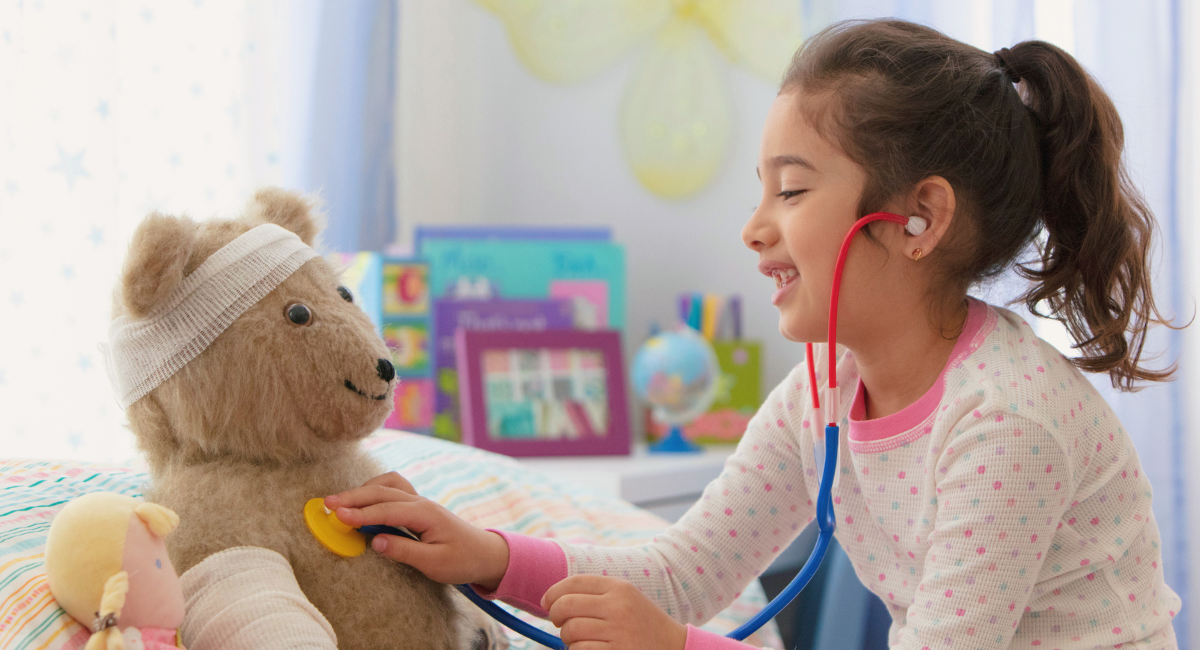
Understanding Mild Head Injuries
Although frightening, most head injuries in children do not cause any significant problems. It is normal when a child gets hit in or bangs his/her head to have some scalp swelling, a headache, be somewhat sleepy, and to even vomit once or twice. It is generally okay to give acetaminophen (Tylenol) for a headache. Ibuprofen should not be given on an empty stomach, so it should be avoided if there is nausea or vomiting. Any abrasion should be washed with soap and water. An antibacterial ointment may then be applied. If there is swelling, ice or a cold pack should be applied at intervals of 20 minutes on and 20 minutes off for the first hour or two. The child should be monitored for the first 24 hours after a head injury by a reliable adult/family member. It is often reassuring, but not usually necessary to wake the child once during the first night to make sure that s/he will open her/his eyes and recognize you.
Call 911 if there is:
- loss of consciousness for more than one minute. Do not move the neck of anyone who is unconscious
from a fall or from an unwitnessed event/injury. - A seizure/convulsion
- difficulty breathing
- extreme irritability, won’t stop crying
- extreme lethargy/sleepiness, not interactive/responsive
Call the office if there is:
- any loss of consciousness
- confusion or agitation
- unsteady gait/walking
- persistent vomiting
- a severe or a persistent headache
- clear or bloody drainage from the nose or ear
- blurred vision
- dizziness
- soft “mushy” swelling on an infant’s head
- a fall on the head from more than 5 feet
- any fall in a child less than 6 months of age
- weakness or numbness in any body part
- the child doesn’t remember what happened
- the child is very pale
- a laceration that looks like it will need stitches or staples
- bleeding that lasts more than 10 minutes despite applying constant pressure
- the child is hit with a hard object that moves very fast, e.g. a baseball bat or golf club
Can You Take Tylenol After Hitting Your Head?
Generally, it is okay to give acetaminophen (Tylenol) for a headache after a minor head injury. However:
- Only give Tylenol if the child is alert and not showing serious symptoms
- Avoid ibuprofen if there’s nausea or vomiting, as it shouldn’t be taken on an empty stomach
- Always follow dosage instructions based on the child’s weight and age
- Monitor the child closely for 24 hours after giving any medication
Frequently Asked Questions
What are the common causes of head injuries in children?
- Falls
- Sports accidents
- Vehicle accidents
- Assaults
How long does a concussion last?
- The duration of a concussion can vary, but most resolve within a few weeks.
Can a head injury cause long-term problems?
- In some cases, severe head injuries can lead to long-term consequences, such as cognitive difficulties or behavioral changes.
Tylenol for Head Injuries
Is Tylenol safe for children with head injuries?
- Yes, Tylenol can be used to relieve pain and reduce fever in children with mild head injuries.
How often can I give my child Tylenol for a head injury?
- Follow the dosing instructions provided on the Tylenol packaging.
Are there any side effects to Tylenol?
- While generally safe, Tylenol can have side effects, especially if taken in excessive doses.
Helmets for biking, skiing, and other sports, car seats, booster seats, gates on stairs, and window guards are ways to prevent some head injuries. If any questions or concerns, please give us a call!
Discover More Must-Read Pediatric Tips and Advice
At Monadnock Community Hospital, we are committed to supporting you and your family with reliable information and expert advice. Be sure to check out our other pediatric blog posts for more tips on keeping your child healthy and happy. From newborn care to managing common childhood illnesses, our blog offers a wealth of knowledge to help you navigate the joys and challenges of parenthood.
Why Choose Monadnock Community Hospital’s Pediatrics Department?
Your child’s health is our top priority at Monadnock Regional Pediatrics. From birth through adolescence, our expert team of board-certified pediatricians and nurses provides compassionate, personalized care. We partner with families to create tailored health plans that foster a healthy, happy future. Serving the community since 1923, we’re committed to delivering high-quality, accessible care in a warm and nurturing environment. Trust us to support your child’s well-being every step of the way.

 )
[_extra_sidebar_content_0_content] => Array
(
[0] => field_5b1ac5808389e
)
[_yoast_indexnow_last_ping] => Array
(
[0] => 1755707722
)
[page_sections_0_hero_slider] => Array
(
[0] => 0
)
[_page_sections_0_hero_slider] => Array
(
[0] => field_5af4ae4adb200
)
[page_sections_0_image] => Array
(
[0] => 38266
)
[_page_sections_0_image] => Array
(
[0] => field_5af4b0553202b
)
[page_sections_0_title] => Array
(
[0] =>
)
[_page_sections_0_title] => Array
(
[0] => field_5af99e4fd1223
)
[page_sections_0_text] => Array
(
[0] =>
)
[_page_sections_0_text] => Array
(
[0] => field_5bfc041f4dfcd
)
[page_sections_0_actions] => Array
(
[0] =>
)
[_page_sections_0_actions] => Array
(
[0] => field_5af4b0783202c
)
[page_sections_1_section_title] => Array
(
[0] =>
)
[_page_sections_1_section_title] => Array
(
[0] => field_5ada5134d3021
)
[page_sections_1_wysiwyg] => Array
(
[0] =>
)
[_extra_sidebar_content_0_content] => Array
(
[0] => field_5b1ac5808389e
)
[_yoast_indexnow_last_ping] => Array
(
[0] => 1755707722
)
[page_sections_0_hero_slider] => Array
(
[0] => 0
)
[_page_sections_0_hero_slider] => Array
(
[0] => field_5af4ae4adb200
)
[page_sections_0_image] => Array
(
[0] => 38266
)
[_page_sections_0_image] => Array
(
[0] => field_5af4b0553202b
)
[page_sections_0_title] => Array
(
[0] =>
)
[_page_sections_0_title] => Array
(
[0] => field_5af99e4fd1223
)
[page_sections_0_text] => Array
(
[0] =>
)
[_page_sections_0_text] => Array
(
[0] => field_5bfc041f4dfcd
)
[page_sections_0_actions] => Array
(
[0] =>
)
[_page_sections_0_actions] => Array
(
[0] => field_5af4b0783202c
)
[page_sections_1_section_title] => Array
(
[0] =>
)
[_page_sections_1_section_title] => Array
(
[0] => field_5ada5134d3021
)
[page_sections_1_wysiwyg] => Array
(
[0] =>